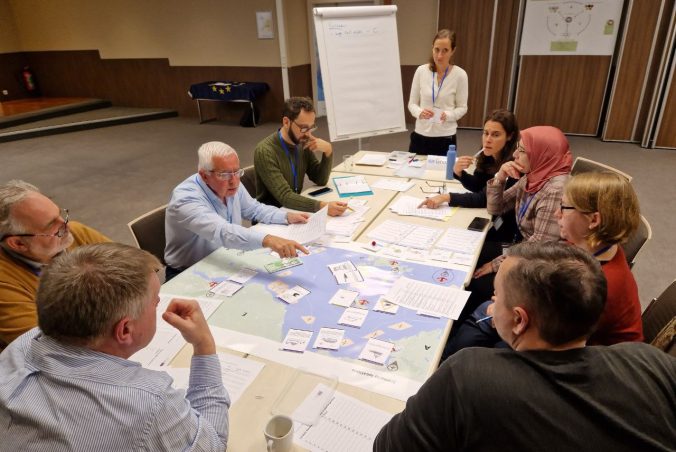
One Incident, One Response framework proposed at workshop in Brussels
Last week, Sea Alarm organised the ‘One Incident, One Response’ workshop in Brussels to explore the future needs of maritime incident response in a changing world. At the workshop, Sea Alarm revealed a draft proposal for a framework for holistic and integrated management and launched the brand new OneX tabletop package.
Under the EU funded IRA-MAR project, Sea Alarm welcomed a range of onshore and offshore authorities to Brussels from 16 different European and North African countries, as well as representatives from the European Commission. The aim of the workshop was to give the opportunity to different countries to discuss, tabletop and compare emergency systems, structures of incident management and ways of decision making to improve the effectiveness of European marine emergency response.
The world is changing, and with it so too is the maritime world. The use of new fuels for vessels, increasing size of vessels, transport of Hazardous and Noxious Substances (HNS), new infrastructure at sea such as wind farms, and increasing intensity of storms due to climate change are just some of the new challenges that are emerging. These changes are bringing a wide range of new risks and challenges to the emergency response capabilities of both maritime and onshore authorities.
With an increasing variety of possible incident scenarios, it is important that maritime and onshore authorities can come together as one to address and manage the emergency at hand. An effective response must be holistic, in that it should connect the variability of scenarios to the variability of values and stakeholders. Such a response should make sure that the system that is activated to protect the values and stakeholders can deliver on tasks, and not only on responsibilities. It must also be integrated so that it builds not only on authorities who have defined emergency response responsibilities, but also on enabling other parties to play an effective role in assisting the response. This requires a wider programme of awareness building, training and exercising, for which other authorities, scientists, and NGOs could be invited who could make a difference provided that they are prepared and resourced to play role.
In view of this explanation, the workshop participants thought that the term ‘holistic and integrated management’ could be re-branded into a the term ‘One Incident, One Response’ for easier communication. The One Incident One Response philosophy basically means that during an incident, despite all its complexities, complications, partial problems and challenges, whoever has the responsibility to deal with each of these, it should be dealt with the aim of delivering one, coherent, professional response.
A draft proposal for a framework in support of this philosophy was presented for feedback from the authorities present, and resulted in many good insights being provided which will be integrated into a final proposal delivered as part of the IRA-MAR project. The framework proposal from the IRA-MAR project will be presented to the Regional Seas Agreements for further discussion as a tool to help achieve their targets on holistic and integrated management on marine emergencies.
Sea Alarm would like to thank the participants for their valuable insights, and we look forward to working together on the One Incident, One Response framework.

